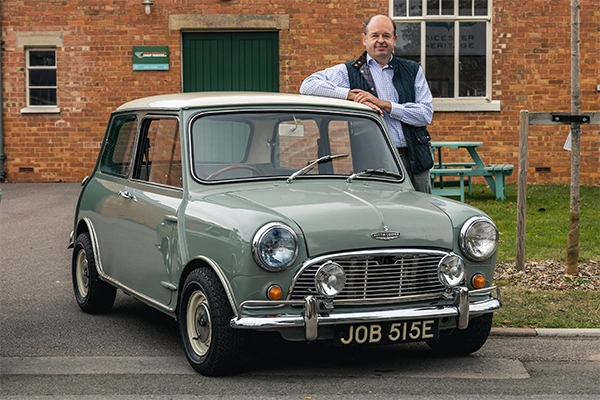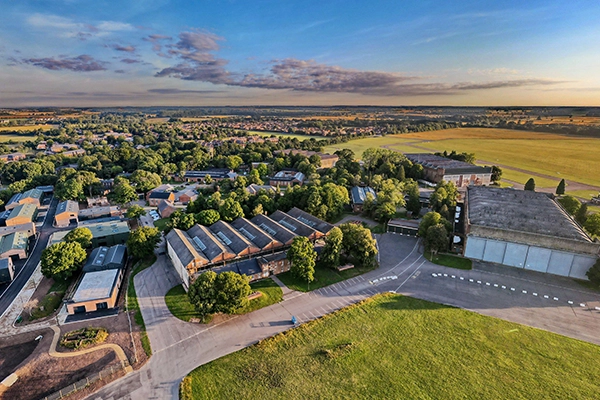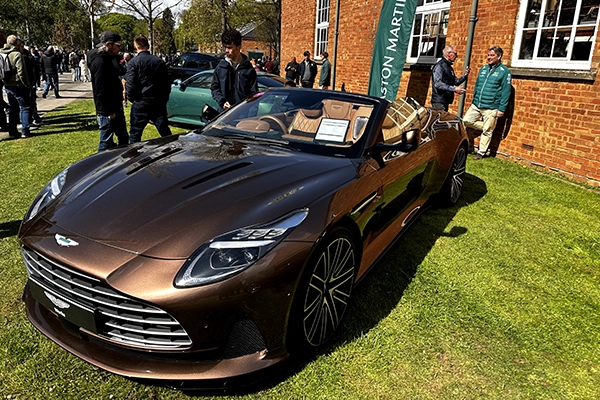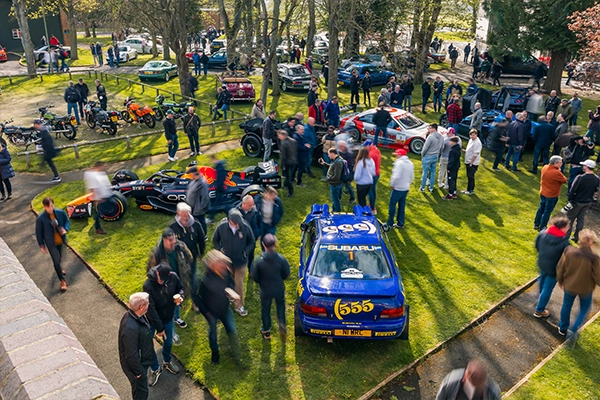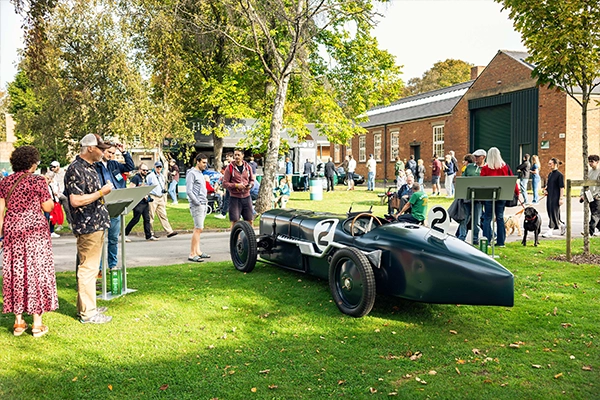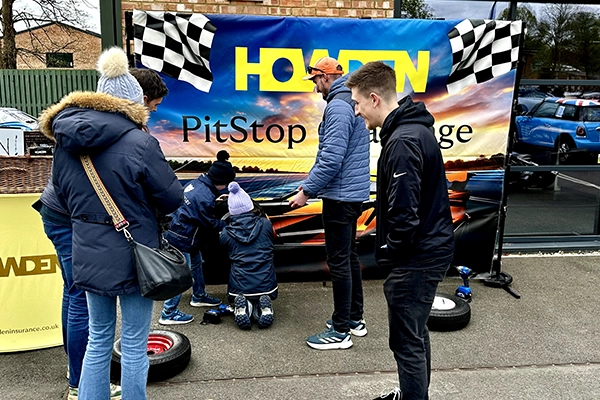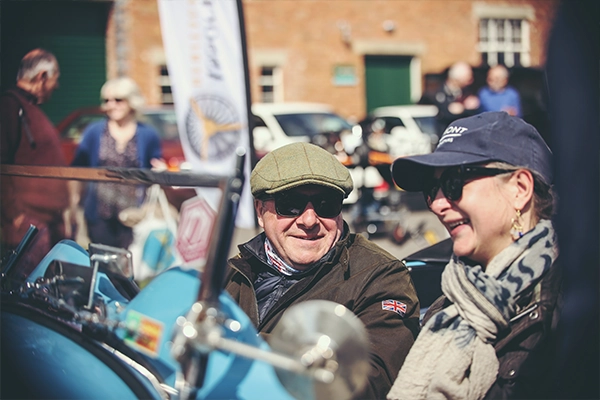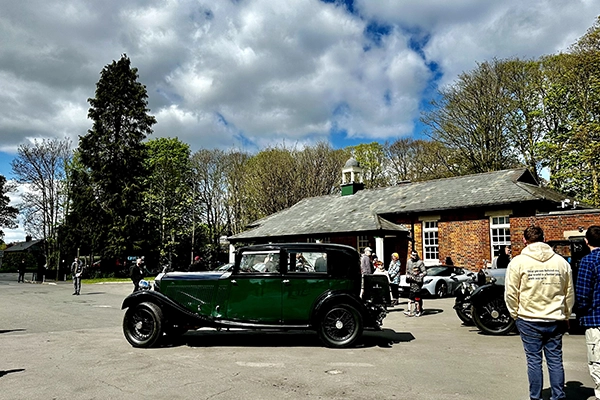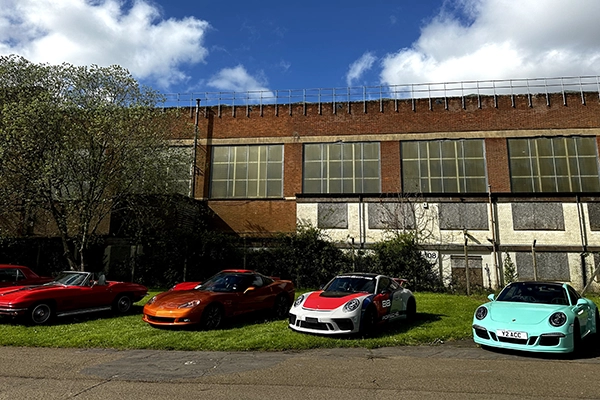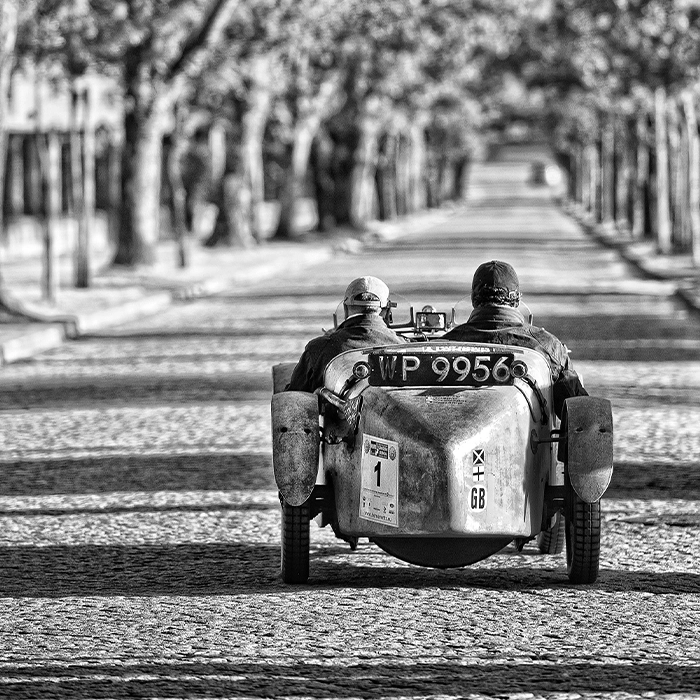02 May 2024
Bicester Heritage - A happy accident
10 minutes
Dan Geoghegan had a dream to create a country club for classic cars – and now Bicester Heritage is the UK’s epicentre for enthusiasts.
|
(Image: Dan Geoghan with his Mini Cooper S) |
I love old cars. My dad ran a country garage in Penpergwm, on the old A40 between Abergavenny and Raglan, in Wales, so my family was very much part of the community. On market day, news would come from far and wide as all the farmers passed through. Dad was always a talker, chatting to locals about what they were doing and where they were going; he made time for everyone and would say ‘if you haven't got five minutes, don't call in’. On Sundays, he would tinker with his 1935 Alvis Speed Twenty. It was his pride and joy (although mum was more of a driver) so, growing up, my life revolved around cars and people. I inherited the Alvis and I am, I have realised, my father’s son – perhaps that’s where my dream of creating a country club for classic car enthusiasts began – I hankered after a place where people could meet as well as buy a car or store it, drive it, fix it and be part of a community. The idea did not really develop until I found myself with a broken pelvis after an accident during the Flying Scotsman vintage motor car rally with my great friend Bob Meijer. I was pretty down but had plenty of time to think and maybe a bit of subconscious fear crept in about life being short. |
The more I mulled it over, the more I realised the classic car industry was sleepwalking towards a problem, with a gap between what was being provided for classic car owners and what was needed. Skills were dying out as mechanics were often one-man bands and there were no specific apprenticeship courses or knowledge transfer.
From my sick bed I began to develop my thoughts about needing a site with lots of empty buildings to give them sustainable futures and economic viability.
I couldn't think of a reason why it wouldn't work and decided to look at disused airfields which had a reputation for being well-built. General Sir Hugh Trenchard, ‘the father of the Royal Air Force’, had created 100 air stations in the East of England during the 1920s to defend Britain against the threat of aerial bombardment. These were self-contained communities with residential, administrative and technical buildings, like a village, designed to bring about a sense of community and relevance.
While I was still having to use crutches, I would get one of my friends to drive me from London along the M40 and around Oxfordshire – which I felt was pretty much the middle of the country.
|
|
Many of the RAF sites had been concreted over for housing, but RAF Bicester remained intact. It had sat more or less disused since the 1970s but remained the best preserved of the bomber bases. The hangars, barrack blocks and fire station were all characteristic of Trenchard’s template. Everything was dilapidated, yet intact, including the operations’ block, parachute store and watch tower which were the first of their type in this country. The Ministry of Defence (MoD) allowed one visit to the airfield before putting in a bid and I will never forget the feeling as I walked up the avenue to Blast House. I had goosebumps, I was shivering and thinking “This is it. I want it, I want it.” I went home, gave up my job (a corporate finance business in London) and spent the next nine months researching, writing documents, contacting people and getting advice. I cut into my life savings because I couldn't see why this plan for a classic car centre of excellence wouldn't work. I called on enthusiasts and investors to structure a company and help me gather advice on a bid – the agricultural value was £10,000 an acre but this 348-acre site also had 50 derelict buildings, 19 were listed and 13 were ancient monuments which made it difficult to value – even more so as this was a conservation area and there was no time to undertake surveys. Together we wanted to create something that was innovative and could solve an industry problem. This was the right site, at the right time. In a way, I'd had a wonderful accident, the classic car industry was spluttering and needed a solution. (Image: Aerial shot of Bicester Heritage and the airfields showing newly renovated buildings next to properties awaiting refurbishment) |
Shooting blind
At this planned one-stop shop, specialists would work together and become more efficient to give the customer a better experience. It would be in the centre of the country and a great place to hang out to enjoy motoring hobbies. It was not going to be a museum but a working site, not about the past, but the future of the past.
We bid £3.48 million, shooting blind, not knowing whether we were going to be hampered by asbestos, contaminated land or what Historic England might require, as RAF Bicester had been put on the at-risk register in 2008. Of all the defence estates it was most at risk of inappropriate development. An earlier application for residential planning, which would have meant demolition of many of the wonderful buildings, had been thrown out and red tape put in place to preserve its layout and form.
That informed our plan for intelligent management of change to sustain the historic environment for present and future generations. We wanted the right thing to be done and to respect what was there and that probably opened the envelope when it came to the confidential tender. The MoD scored applications on price, use, time frame and reputational risk – but I would like to think our values and experience scored highly. I'd gone to see 10 investors to get some money up front and structured the company. I'd written the memorandum for investment, had that signed off by a lawyer so the document we submitted already had a company number.
We went through all the interviews, presented our business plan and waited for a decision. I heard nothing for months so picked up a holiday brochure thinking I could fly to New Zealand for a month if my life’s passion project failed.
Eventually, I could stand it no longer and called the MoD representative just before Christmas and got a... “Oh, I've been meaning to call. I've been talking to my counterparts at the MoD and yes, you're the preferred bidder.”
I'm crying now just remembering that moment. I called Bob, who had supported me through the bid, and we went to the pub for lunch and a pint of Pride.
The start of the end of the beginning
The new Bicester Heritage team completed paperwork for purchase just before Easter 2013 and the MoD’s representative turned up with a Jiffy bag of 300 sets of keys with no labels.
That was it, we were left to explore buildings where vandals and graffiti artists had left their mark, but the buildings had survived intact because they had been so well constructed.
Restoration was soon under way and we became one of the first companies in the country to sign a Heritage Partnership Agreement with the local district council to pre-agree the materials, the period-correct colours and conservation methods so we could actually just get on to restore the buildings in an appropriate way and we did not have to bother the conservation officer every time we needed to do something – except for larger planning permission schemes or change of use.
|
(Image: Visitors can drool over new cars as well as classic cars at Bicester Heritage Scramble Days) |
We had a 10-year business plan but achieved it in Year 6. With the right officers to create this jigsaw puzzle and the luxury to curate the site with a new vision, we instilled strong values to look after the customer and look after each other. Bicester Heritage is now held up as a national exemplar of constructive conservation because it is a working site and not another coffee shop, museum or art studio. Every building has economic viability, it's sustainable. Five of our first 10 businesses were start-ups with a younger vision, something to prove, and people who understood the modern customer. They're great ambassadors for us and I love that vibrancy. We enjoy their thrill and we could share knowledge and help with ideas as we're always passionately interested in them being successful, hearing their stories about how they're coping, who they're meeting. What we’ve created is a sense of family, a pride in being here and always wanting to come through the gate. At first I was based in a portable cabin and I saw people peering through the gates or they would knock on the window and say “I grew up here”, “My dad was stationed here”, “I worked here in the 1940s”. |
Local people were interested in what we were doing and we wanted them to visit so we organised an open day – we literally threw down some straw bales and brought our cars. We called it Scramble Sunday. A call to action, echoing when the Scramble Bell was rung at fighter airfields. About 350 people turned up with their cars; it was a sort of car show with an interesting Bugatti next to a Renault 5 and somebody's Mini next to a pick-up truck and everyone talking to each other. That’s how our events started and now we have regular scrambles and 7,500 people turn up!
|
(Image: A popular Scramble day at Bicester Heritage) |
(Image: Scramble Day at Bicester Heritage attracts 8000 visitors) |
|
(Image: Family fun with Howden at Bicester) |
(Image: Marcus and his wife Tiggy at the Biceser Heritage Sunday Scramble April 2022. Credit Will Boradhead) |
We are now a family
Classic cars are a hobby... the kind of thing my dad did on Sunday, tinkering with old cars. But actually, in the modern world, it's much more – it’s away from the digital world, it’s a fun way to travel, it’s adventure, it's meeting people, it's like having a puppy in a park - people come to you.
|
(Image: Bicester Heritage Main Avenue)
|
We have a nice campus with lots of open space and hundreds of mature trees. People bump into each other walking their dogs (there’s lots of rescue dogs), Neil on the gate immediately makes visitors feel welcome and when I go for a walk I often imagine how this site was in the 1920s – what that must have felt like then, coming through the gate up to the airfield and seeing the station headquarters, the guard room and everything that was going on, the residential quarters, the family life. It was a community, there was a pride, there was a vision, there was a mission, a passion, a vibrancy and energy. We benefit from that history and we are now making our own. We have seen romances blossom, weddings and babies in this 21st century community. We are starting a creche and want to look after people. It will be a nice thing when my three children come back in 20 years and remember they climbed on the bunker, went to a car show and, say, saw a chap who used to weld bits together. There is a continuity – it's a place with a soul, but it's got human scale and human values. And it's nice to see on a Friday night, people go for a drink. We have an on-site brewery and the brewer is a Formula One engineer. Everybody's got a connection to some sort of motoring. |
The 50 businesses on this site were all new to Bicester and all involve different high-skill, high-knowledge jobs. There are 500 people here now and everyone brings their own expertise. Among them are Angus Forsyth and Marcus Atkinson of Howden insurance brokers; Ewen Getley, of Kingsbury Racing, who restores racing Bentleys in the Engine Fitting Shop; Guy Lachlan, of Motor Spirit, supplier of plant-based fuel; James Mitchell in the Blast House who buys and sells some of the most exciting British sports cars from the 1950s; Tomas de Vargas Machuca, of HERO-ERA in the Command Works, the top historic motoring events company, running classic and vintage car rallies. We had 400 initial inquiries for 50 units and had the luxury of picking and choosing, but we would have done that anyway. I'd rather an empty building than somebody who wouldn't fit.
|
(Image: Cars line up against the heritage buildings) |
We have also embraced RAF Bicester’s training heritage by introducing the Starter Motor charity six years ago to promote apprenticeships. It offers youngsters an opportunity to become ambassadors for the charity and in the last couple of years we've had 5,000 young visitors on careers days. The charity has a dozen classic cars from Austin 7s to Morris 1000s so the young people can attend an event by borrowing a classic car and go off to Goodwood or wherever in their ambassador’s uniform to spread the word … and get hooked on motoring.
We have a serious message, which is, this isn't just about old cars. There's insurance, there's training, storage, administration, travel, project management, construction, PR, engineering, manufacturing, design. These are transferrable skills. Education has always been a big thing at RAF Bicester and it remains so because there's always the next chapter…
Classic car insurance
|
(Image: Angus and Marcus in the Austin Ulster) |
Howden classic car insurance experts Angus Forsyth and Marcus Atkinson got the call from Bicester Heritage CEO Dan Geoghegan to ask them to make the former RAF Bicester airfield their base due to their reputation for competitive and discreet cover for the world’s most precious cars. They can cover a vast array of classic and vintage models and offer insurance solutions for collectors and enthusiasts alike. Plus, they only work with insurers who provide a great service and share their passion for the classic motor industry. To speak to us about your classic car insurance call 01869 943496, or email privateclients@howdeninsurance.co.uk |

